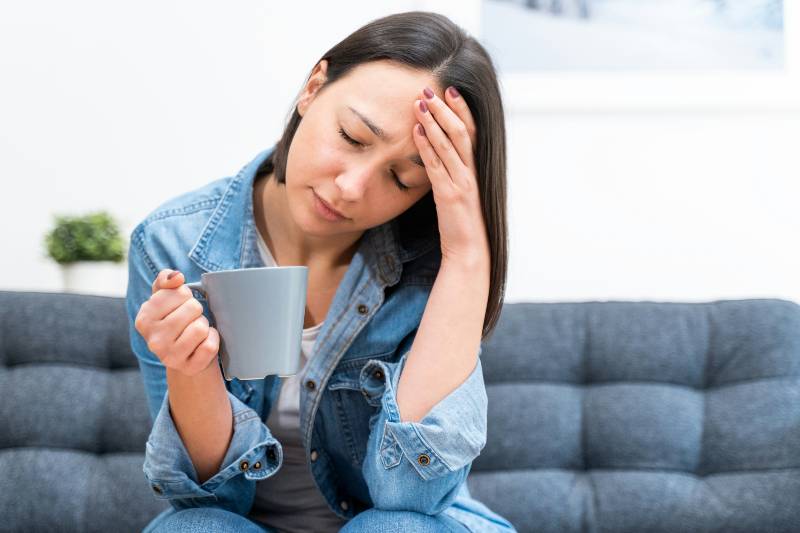You have to take antibiotics for infections caused by bacteria, or to prevent infection after specific medical procedures or surgeries.
However, you find you’re battling an unexpected side effect—fatigue. While antibiotics are pivotal in fighting bacterial infections, it’s not uncommon to feel sluggish or weakened while on these medications.
It can be a frustrating experience, but there are ways to combat this exhaustion and get back to feeling like yourself.
Why Do Antibiotics Make You Feel Sluggish?
When you take antibiotics, your body is not just a battleground for fighting off bacteria; it’s also processing the drugs you’re ingesting. This process can take a toll on your system, causing feelings of tiredness or weakness.
Antibiotics can disturb the balance of good bacteria in your gut, which is essential for digestion and vitamin absorption, potentially leading to nutrient deficiencies that contribute to your fatigue.
Furthermore, your immune system expends energy to fight the infection, which can cause you to feel exhausted.
Some antibiotics can penetrate deep into the body’s tissues and cells, where they can interfere with the normal mitochondrial function—your body’s energy-producing factories. The result is a feeling of tiredness that lasts throughout the course of your antibiotic treatment.
Some people may also experience an allergic reaction to certain antibiotics, which can manifest as fatigue. In addition, other side effects like nausea, diarrhea, or vomiting that sometimes accompany antibiotic use can lead to dehydration and electrolyte imbalances, further contributing to a feeling of weariness.
It’s important to listen to your body and to take the necessary steps to help mitigate these side effects.
How Can You Overcome Weakness From Antibiotics?
Dealing with weakness while on an antibiotic regimen can be quite challenging. It feels like you’re taking one step forward in treating your infection and two steps back with the fatigue that accompanies it.
However, there are actionable steps you can take to help boost your energy levels and lessen the tiredness that antibiotics can bring. A combination of adequate rest, proper hydration, dietary considerations, and movement can help you become more energetic and comfortable.
1. Enough Sleep
Aim for 7–8 hours of quality sleep to help your body recover and recharge.
Good sleep hygiene can make all the difference when you’re trying to combat fatigue. This means creating a restful environment, sticking to a consistent sleep schedule, and avoiding screens before bedtime.
If antibiotics are disrupting your sleep due to side effects like gastrointestinal upset or restlessness, speak with your doctor about the best time to take your medication or whether taking it with food might help.
2. Hydration
Dehydration can also lead to fatigue. Drinking lots of water all day can keep you hydrated, especially if antibiotics make you have diarrhea.
Maintaining proper fluid balance is important for your cells to function properly, and even mild dehydration can make you feel tired and sluggish. Aim for clear or light-yellow urine as a sign of good hydration.
3. Avoid Alcohol
You should also consider avoiding alcohol as alcohol is a depressant and can exacerbate the feeling of lethargy.
Moreover, it can interact negatively with certain antibiotics, potentially increasing the risk of side effects or limiting the effectiveness of the medication. Staying clear of alcoholic drinks until you’ve finished your course of antibiotics and are feeling better is a wise choice.
4. Avoid Other Medications
You should also avoid additional medication or supplements that can cause drowsiness unless they are prescribed or recommended by your doctor.
Some over-the-counter medicines and herbal supplements can interact with antibiotics, not only increasing fatigue but also affecting the way the antibiotics work. Always check with a healthcare provider before combining any medications or supplements with your antibiotic regimen.
5. Have a Balanced Nutrition
Good nutrition is essential when recovering from an infection and when dealing with the side effects of antibiotics. Focus on a balanced diet rich in fruits, vegetables, lean proteins, and whole grains. These foods provide the nutrients your body needs for energy and recovery.
In particular, B vitamins and iron are vital for energy production, while antioxidants can help fight inflammation.
6. Gentle Exercise
Engage in light to moderate physical activity as it can boost energy levels and promote a sense of well-being. Even a short walk or gentle stretching can improve circulation and oxygenate your body, countering feelings of sluggishness. Always listen to your body and do not
overexert yourself, especially when you’re recovering from an illness.
7. Manage Stress Levels
Elevated stress can worsen fatigue. Techniques like deep breathing, meditation, or yoga can reduce stress and enhance your energy levels. Even setting aside time for hobbies or relaxation can make a positive impact on your physical health and counteract the draining effects of stress.
8. Monitor Iron Levels
Since antibiotics can sometimes affect the stomach lining and nutrient absorption, it’s worth monitoring your iron levels, especially if you’re prone to anemia. Low iron can lead to fatigue, so if you suspect this might be an issue, speak with your doctor about having your levels checked and possibly taking a supplement if needed.
9. Stay Socially Connected
Maintaining social contacts, even if just virtually, can boost your mood and energy levels. Sharing your experiences and receiving support from friends and family can also help you cope with the side effects of antibiotics.
10. Other Tips
- Take Antibiotics as Directed: Following the prescribed dosage and schedule helps your body adjust to the medication and can reduce the risk of side effects.
- Take a Probiotic: Consider taking probiotics, which are live bacteria and yeasts beneficial to digestive health. They can help restore the balance of good bacteria in your gut disrupted by antibiotic usage. However, it’s essential to space out the timing of the probiotic and antibiotic to prevent the antibiotic from killing the beneficial bacteria you just consumed. Speak to your doctor for recommended types and timing.
- Talk to Your Doctor: If you have severe or persistent fatigue, it’s important to consult with your doctor. They might adjust your dosage, change your prescription, or investigate other causes of your tiredness.
Keep in mind that if the fatigue doesn’t get better, or if it gets worse, within a few days of starting an antibiotic, call your doctor. It could be a sign that the antibiotic isn’t right for you or that something else is going on.
How Long Does Weakness From Antibiotics Last?
The duration of weakness or fatigue from antibiotics can vary depending on the type of antibiotic you’re taking, the dosage, your overall health, and how your body reacts to the medication.
Generally, fatigue linked to antibiotic use might last as long as you are taking the medication. Some individuals might notice improvement shortly after finishing the course, while others might feel tired for a little while longer as their body recuperates.
Infections themselves can drain your energy, so it may take a bit of time after the antibiotics have cleared the infection for you to fully regain your strength. It’s important to give yourself grace during this recovery period and not rush the process. Prioritize rest, nourishing food, and light activity, as tolerated, to help your body heal.
If you continue to feel fatigue persisting for several days or even weeks after completing your antibiotics, consult with your doctor. It can be an indication of a more complex issue, such as a resistant infection or another underlying health problem unrelated to the antibiotic use.
Why Shouldn’t You Lay Down After Taking Antibiotics?
For certain antibiotics, particularly those that can cause irritation to the esophagus or stomach, lying down immediately after taking them can increase the risk of discomfort or injury to these areas.
Remaining upright for at least 30 minutes to an hour after taking these medications helps ensure that they travel down into your stomach, where they can be absorbed without causing harm.
Furthermore, some antibiotics are absorbed better when the body is in an upright position. If you lie down too soon after taking them, you may not get the full benefit of the medication. This is why it’s important to follow the instructions provided with your antibiotic prescription regarding posture and activity.
Moreover, lying down might contribute to the sensation of fatigue. Maintaining a slight level of activity post-dosing can help you feel more awake and can be beneficial for your overall recovery.
So while it may seem like a good time to rest immediately after taking your medication, resist that urge if your doctor or pharmacist has advised against it.
When To Seek Medical Advice?
If fatigue becomes severe, lasts longer than expected after finishing your antibiotic course, or is accompanied by other symptoms like severe pain or a high fever, don’t hesitate to reach out to your healthcare provider.
This could indicate an allergic reaction, a secondary infection, or that the current antibiotic is not effectively addressing the infection. In such cases, your doctor may need to adjust your treatment plan.
Additionally, if you’re experiencing symptoms like shortness of breath, chest pain, or an irregular heartbeat along with fatigue, seek immediate medical attention. These could be signs of a more serious condition that requires prompt evaluation.
Understanding Antibiotic Resistance and Its Role in Fatigue
Overuse and misuse of antibiotics can lead to antibiotic resistance, where bacteria no longer respond to the medications designed to kill them. One of the lesser-discussed effects of antibiotic resistance is an increased risk of persistent infections, which can result in prolonged fatigue. To combat this:
- Do not pressure your doctor to prescribe antibiotics if they’re not necessary.
- Avoid using leftover antibiotics from previous treatments without consulting a doctor.
- Do not take antibiotics prescribed for someone else.
Conclusion
Battling infection is tough enough without the added challenge of antibiotic-associated fatigue. However, through careful management and self-care, you can overcome this side effect and return to your normal daily activities.
You need to get adequate sleep, stay hydrated, and maintain a healthy diet. Avoid alcohol and unnecessary medications, and take proactive steps like engaging in light exercise and stress-reduction techniques.
Your body is a complex system that requires balance and care, especially when it’s fighting an infection. By listening to your doctor’s advice and paying attention to your body’s needs, you can minimize the impact of antibiotics on your energy levels.




